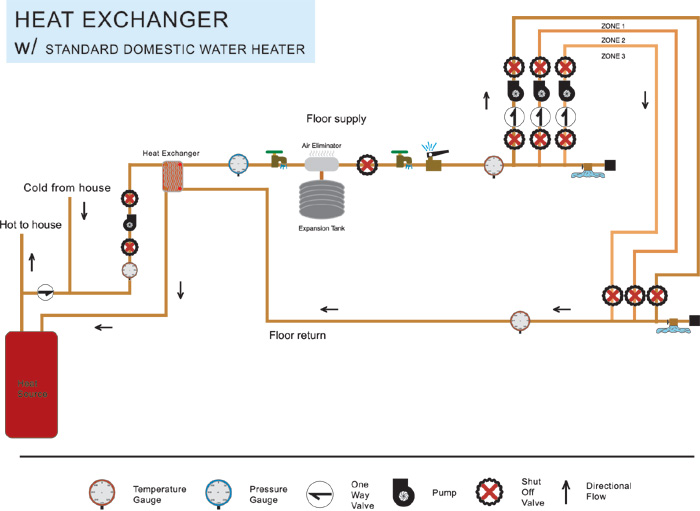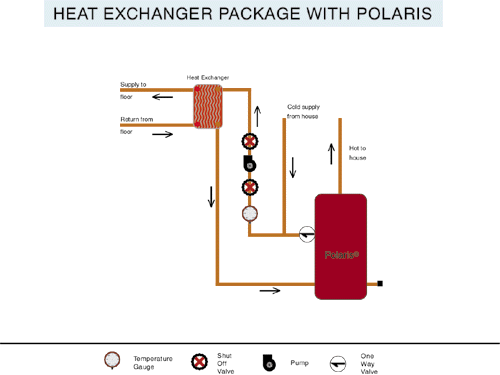A water heater heat exchanger system transfers heat from one medium to another, efficiently heating water. It uses a coil or plate exchanger to achieve this.
A water heater heat exchanger system is essential for efficient water heating in residential and commercial settings. These systems utilize a coil or plate exchanger to transfer heat from a heating source to the water, ensuring a consistent and rapid heating process.
They are energy-efficient and can significantly reduce utility bills. The compact design makes them suitable for various applications, including solar water heaters and boiler systems. Maintenance is straightforward, often requiring just periodic cleaning to ensure optimal performance. Investing in a water heater heat exchanger system can enhance energy efficiency and provide reliable hot water on demand.
Page Contents
- 1 Introduction To Heat Exchanger Systems
- 2 Types Of Heat Exchanger Systems
- 3 Benefits Of Using Heat Exchangers
- 4 Installation And Maintenance
- 5 Common Issues And Solutions
- 6 Enhancing System Performance
- 7 Case Studies And Real-world Examples
- 8 Future Trends In Heat Exchanger Technology
- 9 Frequently Asked Questions
- 10 Conclusion
Introduction To Heat Exchanger Systems
A heat exchanger transfers heat from one fluid to another. It works without mixing the fluids. This device is very useful in many systems. You can find it in cars, refrigerators, and power plants.
Water heaters use heat exchangers to warm water. The heat exchanger makes the process efficient. It helps save energy and costs. The device also ensures hot water is available quickly. It is a vital part of modern water heaters.
Types Of Heat Exchanger Systems
This system uses a series of tubes. One set of tubes carries the hot water. The other set carries the cold water. The heat transfers from the hot water to the cold water. This system is efficient and reliable. It is also easy to maintain.
This system uses thin metal plates. The plates are stacked together. Hot and cold water pass through alternate plates. Heat transfers through the plates. This system is compact and lightweight. It is great for space-saving solutions.
This system uses coiled tubes. Hot water flows through the inner coil. Cold water flows through the outer coil. Heat transfers between the coils. This design is very efficient. It also saves space. It is perfect for small areas.
Benefits Of Using Heat Exchangers
Switching to water heater heat exchangers can bring many advantages. The main benefit is improved energy efficiency. This can lead to significant cost savings in the long run. Moreover, using heat exchangers is environmentally friendly due to their reduced energy consumption.
Installation And Maintenance
Hire a licensed professional for installation. Ensure the water heater is in a safe location.
Check that the heat exchanger is properly connected.
Use the right tools for the job.
Follow the manufacturer’s instructions closely. Make sure to test the system after installation.
Always check for leaks and fix them immediately.
Inspect the heat exchanger regularly for signs of wear. Clean the water heater at least twice a year.
Check the pressure valve monthly.
Flush the system to remove sediment build-up.
Replace any damaged parts promptly. Ensure the thermostat is working correctly.
Always use high-quality materials for repairs.
Common Issues And Solutions
Scaling happens when minerals build up inside the system. This can block the flow of water. To fix scaling, use a descaler to clean the pipes. Fouling is when dirt and debris clog the system. Regular cleaning helps prevent fouling. Both issues can reduce heating efficiency.
Pressure drops occur when water flow is restricted. This can be due to blockages or leaks. To fix this, check for any visible leaks. Clean or replace any blocked pipes. Always maintain proper water pressure for efficient heating.
Thermal stress happens when the system heats up too quickly. This can cause parts to crack. Use a thermostat to control the temperature. Gradual heating can reduce thermal stress. Regular maintenance checks can also help.
Enhancing System Performance
Use efficient designs to improve heat transfer. Minimize heat loss with good insulation. Clean heat exchangers regularly to prevent clogging. This ensures maximum efficiency.
Choose durable materials for long-lasting performance. Corrosion-resistant metals are best for heat exchangers. Quality materials increase system lifespan and reduce maintenance costs.
Schedule routine checks to keep the system running smoothly. Look for signs of wear and tear. Early detection helps prevent major issues. Keep a maintenance log for tracking.
Case Studies And Real-world Examples
Many homes use heat exchangers for water heating. This system saves energy and reduces costs. Families enjoy consistent hot water for showers and washing.
The installation is simple and fits in small spaces. Eco-friendly options make it popular among homeowners. It helps in reducing the carbon footprint. Most systems last for years with minimal maintenance.
Restaurants and hotels need lots of hot water. Heat exchanger systems are perfect for these businesses. They provide continuous hot water without high energy bills.
Commercial buildings benefit from energy-efficient systems. Office buildings also use these systems for heating and hot water. They are reliable and cost-effective.
Industries like manufacturing and food processing require large amounts of hot water. Heat exchangers handle this demand efficiently. They reduce operational costs and improve productivity.
Factories use these systems to maintain consistent temperatures. This helps in producing high-quality products. The systems are durable and can withstand tough conditions.

Credit: www.radiantcompany.com
Future Trends In Heat Exchanger Technology
New designs make heat exchangers more efficient. Smaller sizes fit in tight spaces. Engineers create better materials to handle heat. These designs save energy and money.
Smart systems help control heat exchangers. They use sensors to check temperatures. Computers adjust settings for the best performance. This makes systems more reliable and user-friendly.
Green technology helps save the planet. Recycled materials are used in building heat exchangers. Systems use less water and electricity. These steps make the world a better place.

Credit: www.radiantcompany.com
Frequently Asked Questions
What Is A Heat Exchanger On A Water Heater?
A heat exchanger on a water heater transfers heat from a heat source to the water, warming it efficiently.
How Often Do You Flush The Heat Exchanger On A Tankless Water Heater?
Flush the heat exchanger on a tankless water heater annually. This prevents mineral buildup and ensures optimal performance.
How Do I Know If My Heat Exchanger Is Bad?
Check for unusual noises, leaks, or reduced efficiency. Inspect for rust or cracks. Monitor for frequent overheating. Seek professional inspection if unsure.
How Much Should It Cost To Replace A Heat Exchanger?
The cost to replace a heat exchanger typically ranges from $300 to $1,500, depending on the unit size and complexity.
Conclusion
Choosing a water heater heat exchanger system can greatly improve energy efficiency. It reduces costs and ensures a steady hot water supply. This system is an excellent investment for any home or business. Make the switch today for long-term benefits and savings.
Enjoy reliable hot water and lower energy bills year-round.
